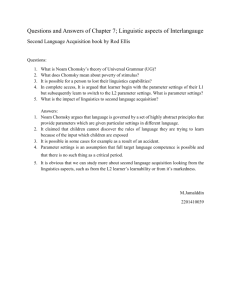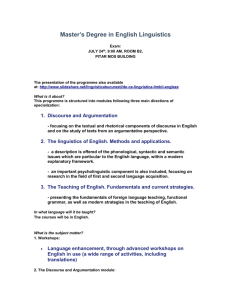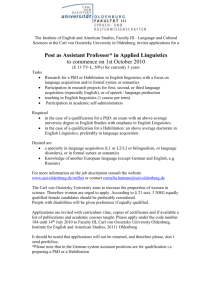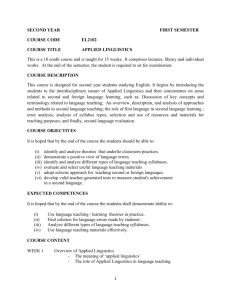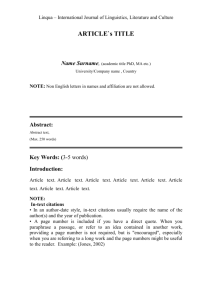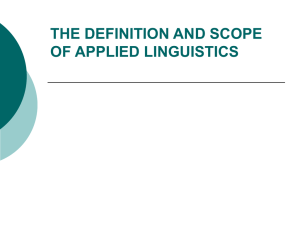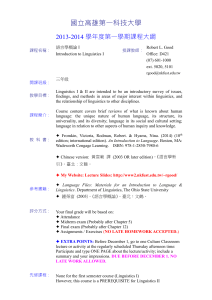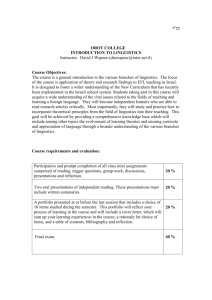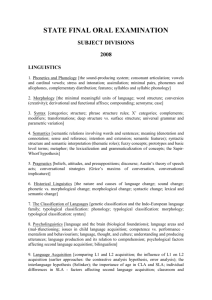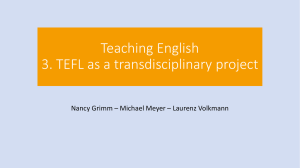Applied Linguistics 1. Code: NBB AN 107G2 Autumn 2015/2016
advertisement
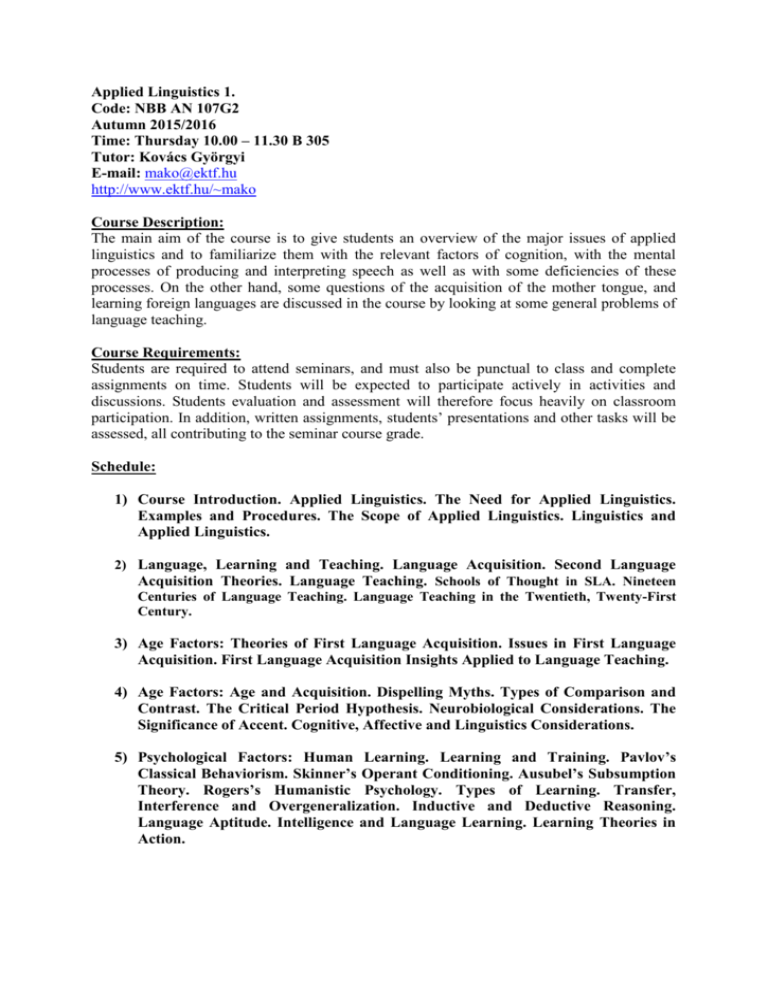
Applied Linguistics 1. Code: NBB AN 107G2 Autumn 2015/2016 Time: Thursday 10.00 – 11.30 B 305 Tutor: Kovács Györgyi E-mail: mako@ektf.hu http://www.ektf.hu/~mako Course Description: The main aim of the course is to give students an overview of the major issues of applied linguistics and to familiarize them with the relevant factors of cognition, with the mental processes of producing and interpreting speech as well as with some deficiencies of these processes. On the other hand, some questions of the acquisition of the mother tongue, and learning foreign languages are discussed in the course by looking at some general problems of language teaching. Course Requirements: Students are required to attend seminars, and must also be punctual to class and complete assignments on time. Students will be expected to participate actively in activities and discussions. Students evaluation and assessment will therefore focus heavily on classroom participation. In addition, written assignments, students’ presentations and other tasks will be assessed, all contributing to the seminar course grade. Schedule: 1) Course Introduction. Applied Linguistics. The Need for Applied Linguistics. Examples and Procedures. The Scope of Applied Linguistics. Linguistics and Applied Linguistics. 2) Language, Learning and Teaching. Language Acquisition. Second Language Acquisition Theories. Language Teaching. Schools of Thought in SLA. Nineteen Centuries of Language Teaching. Language Teaching in the Twentieth, Twenty-First Century. 3) Age Factors: Theories of First Language Acquisition. Issues in First Language Acquisition. First Language Acquisition Insights Applied to Language Teaching. 4) Age Factors: Age and Acquisition. Dispelling Myths. Types of Comparison and Contrast. The Critical Period Hypothesis. Neurobiological Considerations. The Significance of Accent. Cognitive, Affective and Linguistics Considerations. 5) Psychological Factors: Human Learning. Learning and Training. Pavlov’s Classical Behaviorism. Skinner’s Operant Conditioning. Ausubel’s Subsumption Theory. Rogers’s Humanistic Psychology. Types of Learning. Transfer, Interference and Overgeneralization. Inductive and Deductive Reasoning. Language Aptitude. Intelligence and Language Learning. Learning Theories in Action. 6) Psychological Factors: Styles and Strategies. Process, Style and Strategy. Learning Styles. Autonomy, Awareness and Action. Strategies. Strategies-Based Instruction. 7) Personality Factors: The Affective Domain. Affective Factors in SLA. Motivation. The Neurobiology of Affect. Personality Types and Language Acquisition. Measuring Affective Factors. Intrinsic Motivation in the Classroom. 8) Sociocultural Factors: Culture: Definitions and Theories. Stereotypes or Generalizations. Attitudes. Second Culture Acquisition. Social Distance. Teaching Intercultural Competence. Language Policy and Politics. Language, Thought and Culture. Culture in the Language Classroom. 9) Communicative Competence. Defining Communicative Competence. Language Functions. Discourse Anaysis. Pragmatics. Discourse Styles. Nonverbal Communication. Communicative Competence in the Classroom. 10) Linguistic Factors: Cross-Linguistic Influence and Learner Language. The Contrastive Analysis Hypothesis. Error Analysis. Stages of Learner Development. Variation in Learner Language. Fossilization or Stabilization. Errors in the Classroom. 11) Linguistic Skills and Communicative Abilities. The Medium of Language. Listening. Developing Listening Skills. Speaking. Developing Speaking Skills. Reading. Developing Reading Skills. Writing. Developing Writing Skills. 12) End-Term Test 13) Course Evaluation. Recommended reading: Brown, D.: Principles of Language Learning and Teaching, Longman, 2007. Cook, Guy.: Applied Linguistics. Oxford University Press, 2003. Davis, A. – Elder, C.: The Handbook of Applied Linguistics, Blackwell Publishing, 2006. Finocchiaro, M.: English as a Second/Foreign Language. Prentice Hall, 1989. Fromkin, Victoria et al.: An Introduction to Language. 7th ed. Heinle, 2003. Harmer, J.: The Practice of English Language Teaching. Longman, Cambridge, 2004. Krashen, S.: Language Acquisition and Language Education. Prentice Hall, 1989. Lightbown, P. et al: How Languages Are Learned. OUP, 1993. Oxford, R.: Language Learning Strategies. Heinle, 1989. Widdowson, H. G.: Teaching Language as Communication. OUP, 1990.

